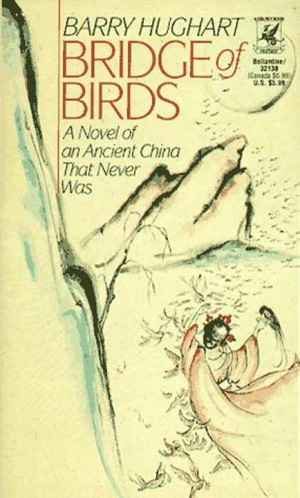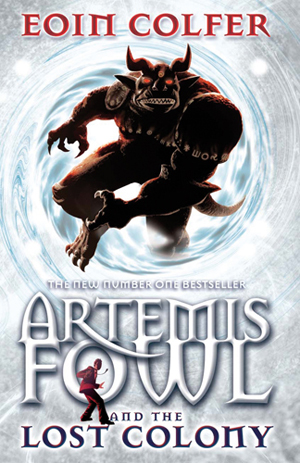I said that I would finish updating Bookends: March 2009 on the day succeeding the night I completed the first half on, but leisure did not find me – so I'm doing it now. So here are the remaining two reviews I promised you,
Bridge of Birds
By Barry Hughart
"My surname is Li and my personal name is Kao, and there is a slight flaw in my character."Master Li Kao
This book is really, really funny. You probably can't tell from this.
A Novel of an Ancient China That Never Was, proclaimed the subtitle on the books front cover with a wink and I couldn't help feeling that we have all been cheated out of an Ancient China That Should Have Been.
The story began in the Chinese village of Ku-Fu where a young man of prodigious physical strength called Number Ten Ox lives. In the days preceding the silk harvest, all the children aged between 8 and 15 were struck by a mysterious disease which first made them scream, then claw the air in front of them as if they were fending off something no one could see. The children would experience convulsions next before finally falling in a deep sleep with their vitals barely hovering above nothing.
Traveling to Peking, he found Master Li Kao – a sage "with a slight flaw in his character" as he so fondly and frequently described himself – and managed to enlist his help in his quest to save the children of his village. What ensued is an adventure which spiralled so rapidly out of proportions that it soon became a breathless race against time to solve a heinous crime perpetrated a thousand years ago – a crime so heinous that it had thrown Heaven itself into unease.
Bridge of Birds is a chinoiserie tale that is surprisingly faithful to the culture it had plundered so thoroughly for its richness. Barry Hughart, an American who served in the Far East when he was in military service, discovered that a great number of Chinese deities had their roots as characters in novels, and set out to write his own. I for one think that he had captured the voices and the personalities of the Chinese people with great precision and wit (being Chinese myself, you know that that is no idle praise). In fact, it is Mr Hughart's humorous asides on Chinese mythology and history which made this book such a pleasure to read. It's a rare book which can make me laugh out loud.
On the other hand, there are times in which the story simply abandons all pretence of fidelity to accuracy and steps seamlessly into the absurd. Someone unfamiliar with Chinese legends wouldn't be able to tell what is true and what Hughart pulled straight out of his ass. Then again, someone like that would simply assume that the entirety of the novel was made up. Bridge of Birds reminded me strongly of The Princess Bride by William Goldman, another great novel. Fans of Mr Goldman's book would certainly find much to love in Bridge of Birds, and vice versa.
As you can probably tell from the novel's title, Hughart's novel borrowed liberally from the Chinese folktale of the Cowherd and the Weaver Girl. Then again, "borrow" is perhaps the wrong word to use here. "Rape" is probably more correct – and I mean that as a compliment to Mr Hughart's inventiveness and to the large size of his balls. What he ultimately came up with is a delightful story of immense beauty and charm which ultimately culminated in a surprising and deeply satisfying conclusion. I'd recommend this to you regardless of what sort of books you like to read.
Score: 9.5/10
Artemis Fowl and the Lost Colony
By Eoin Colfer
"I am not as careless as you, Artemis. I prefer anonymity, until I have something exceptional to be recognized for."Minerva Paradizo
As you can imagine, I don't carry this book around with me in public.
I don't know if it's me or if Eoin Colfer (pronounced Owen) is running out of good ideas. The first three books – particularly the first of the three – in the Artemis Fowl series were clever subversions of ye ole fairytale conventions which first introduced us to the teenage criminal mastermind whose name titled the books. By the fourth book, the novelty and freshness of the series have lost their lustre. The fifth book, the one I'm going to write about in a sec, is almost boring. I suspect that it has something to do with me growing out of children's books, but then again, I am still perfectly capable of enjoying Lemony Snicket's A Series of Unfortunate Events which, from what I can tell, was intended for an even younger audience.
The Lost Colony, in brief, is about Artemis Fowl trying to save an island sequestered out of time and place and the surviving remainder of the Eighth Fairy Family – the demons, never mentioned prior to this book – which lives on it. In this book, he will also "meet his match". This, along with some "twists" in heavy spoiler territory firmly shows that the series, which used to be such groundbreaking exemplars of originality, is now mucking about with TV drama conventions. Also, I liked Artemis Fowl better when he was still an amoral genius who only cared about profit and mental challenges, but I suppose "character development" is simply unavoidable in anything running longer than 3 books.
You'll notice that I've been judging The Lost Colony against by the standards set by its antecedents, hence the mostly negative tone of this review. However if you compare it with most of the other stuff of its genre now, you'll find that Artemis Fowl is still much better than most of the Harry Potter clones which plague the commercial shelves. I'd still recommend this series over most others. And I'd still buy the sixth book, Artemis Fowl and the Time Paradox, as soon as I see a marked down copy at a book fair or warehouse sale.
I merely think that Artemis Fowl fans deserved better than Artemis Fowl and the Lost Colony.
Score: 5/10



No comments:
Post a Comment